Since its inception, the Chico News & Review has paid close attention to the health of this city’s core. A look through the paper’s archives reveals several stories over the last four-plus decades asking slight variations of the question posed in the headline to this feature: “What’s up with downtown?”
The themes from story to story have reflected an ebb and flow of downtown’s fortunes—“constant change,” “rebirth,” “devastation,” “renaissance,” “revival,” “downtown’s changing face”—which have almost always been connected to dramatic events that create another crisis from which to recover. There was North Valley Plaza (the “old mall”), then the Chico Mall (the “new mall,” now Chico Marketplace) siphoning retailers and customers after their openings in 1967 and 1988, respectively. Then came catastrophes such as the Great Recession in 2008 and the recent COVID-19 pandemic, which crippled businesses in all areas.
It’s worth remembering though that, along with those big hits and the common threads of timeless Chico challenges/complaints (parking, cleanliness, safety, homelessness), there’s an enduring reality running through the all of the above: The city’s core has remained. Even today, with so many pandemic-induced challenges—shuttered businesses, decimated work force, crippling inflation, homelessness/housing issues, declines in Chico State enrollment—the historic buildings and wide open streets connecting to the arteries of old highway 99 and long-gone rail lines remain the heart of this city.
So, how’s business?
Many of the downtown businesses owners the CN&R spoke to for this story (especially those in food service) were cautiously optimistic, saying that things are somewhere between “recovering” and “back to normal.” Additionally, there have been dozens of new businesses that have started up downtown since the state reopened a couple of years ago.
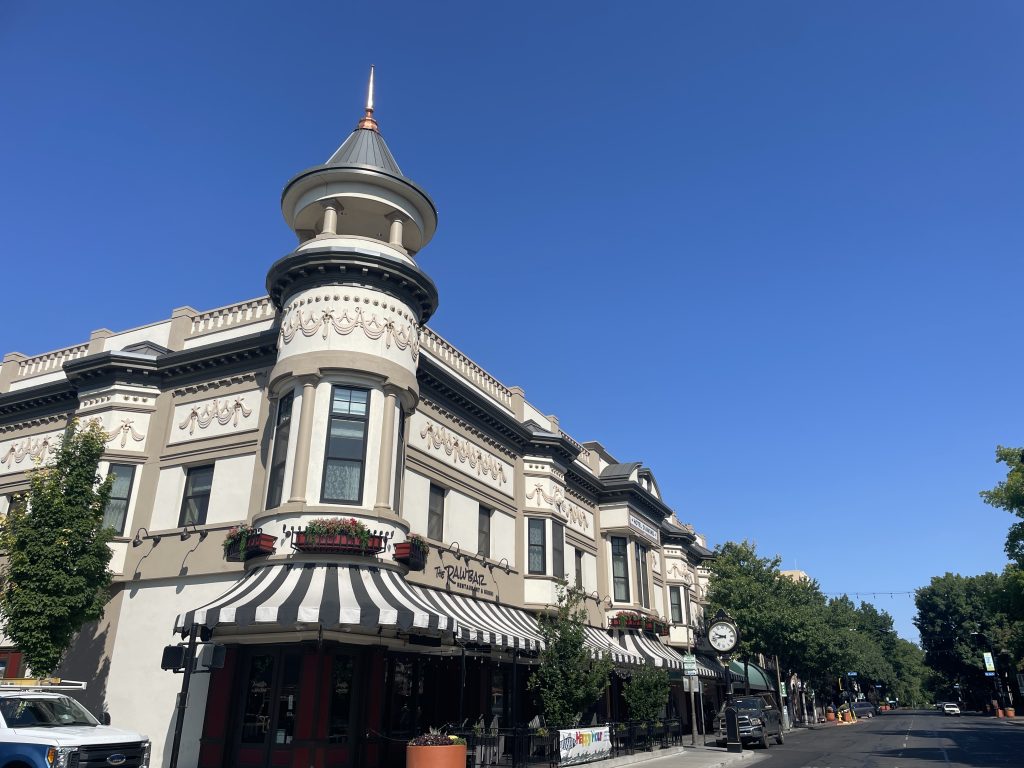
(Photo by Jason Cassidy)
City Manager Mark Sorensen wouldn’t go so far as to say downtown was fully back, only that things are improving. “We see sales tax activity that tells us the amount of commerce that’s going on. We can see that in different sections of town, including downtown as a unit, it’s clearly coming back, but there’s no question it hasn’t come back entirely.” The most recent edition of the Chico Economic Snapshot published by Golden Valley Bank shows that from the second quarter of 2021 to the second quarter of 2022, Chico’s overall economic performance improved by 24.2 percent
The public events hosted by the Downtown Chico Business Association (DCBA) have also returned. According to organizers, the Thursday Night Markets and Friday Night Concerts are attracting more people downtown than ever.
The impacts from homelessness continue to be felt all over Chico, not just in the city center—though the impression that it’s largely a downtown issue has endured.
Irrepressible downtown restaurateur Will Brady’s response to that is: “Open your eyes, go out into the world, Chico is better than almost every other place.”
Though they put it less bluntly, other downtown business owners share the Banshee/B Street Public House co-owner’s sentiment.
“These spaces are really essential to the social fiber of any community, and they have to be nurtured,” said Muir Hughes about the downtown where The Bookstore, the store she owns with husband Josh Mills, has been a pillar since 1976.
“In general, I feel like there are issues that have to be tackled,” Hughes added, “[but] I think downtown has the capacity to flourish.”
What’s going on with the DCBA?
The DCBA had a rough pandemic. The businesses it advocates for were hit hard; its chief funding source, community events like the Thursday Night Market, were canceled; and longtime Executive Director Melanie Bassett retired.
As everything’s gradually opened back up, the organization that was formed in 1975 to “preserve, enhance and promote Downtown Chico as Chico’s Historic District and regional destination for shopping, dining, playing and staying” is trying to figure out how to get back to the work of its mission in a post-COVID Chico.
Greg Scott, former owner of Diamond Steakhouse, is the new DCBA president, and he and his colleagues have put together a three-year plan for getting the operation healthy again.
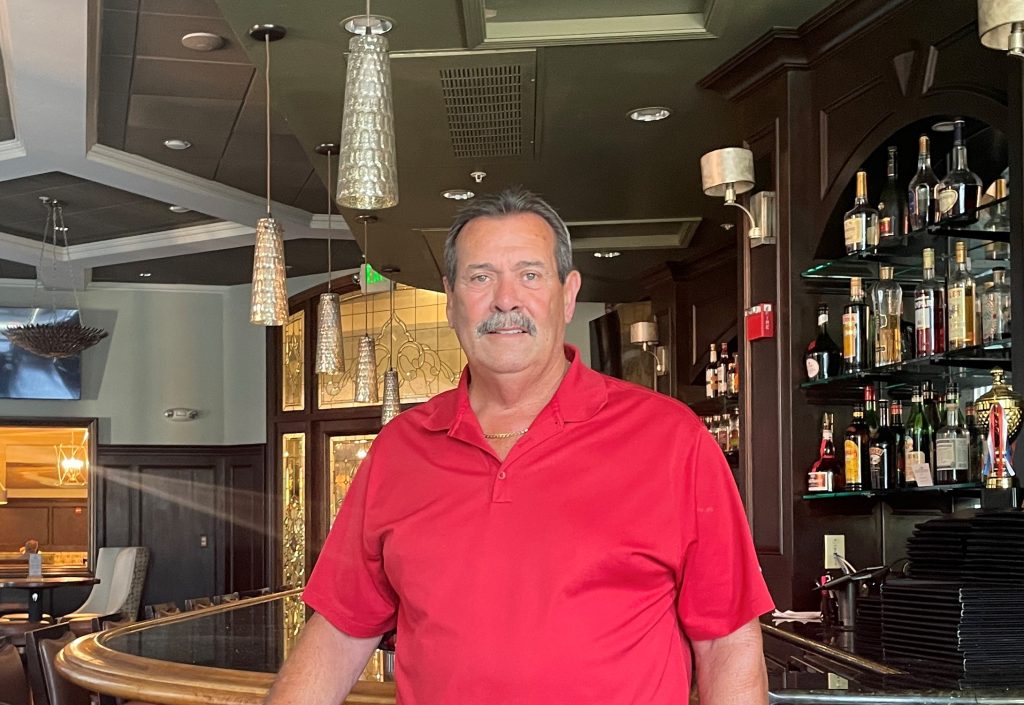
(Photo by Jason Cassidy)
The plan has four areas of emphasis: organizational rebuilding, marketing and communication, events and promotion, and placemaking.
Late last year, it was presented to the city along with a request for $422,400 of American Rescue Plan funds to implement it. The council approved the funding at its Jan. 17 meeting, splitting the money into three installments and including requirements for showing progress to get the remaining balance.
The “organizational rebuilding” part of the plan includes saving money by not hiring a new director just yet, and keeping the DCBA staff to just two employees in charge of managing and promoting events.
The rest of the responsibilities are being handled by a newly revamped board, with seven first-time members. Scott said this board will provide oversight and direction to the employees who will manage day-to-day DCBA stuff. The board’s work has been further delegated to newly formed committees (which include others from DCBA membership as well) focused on big picture items—marketing and promotions, events, place development, restaurants, economic vitality, finance and special initiatives.
“They all have roles and responsibilities and goals,” Scott said about the committees. “They’re out doing that part of the work so the DCBA staff can go out and promote their events and do better engagement with businesses.”
A key component that reaches across all the areas of emphasis in the plan is strengthening partnerships, not just with the city and DCBA’s own membership, but with Chico State, various cultural partners/collaborators and the Downtown Chico Property-based Improvement District (PBID). Scott also sits on the board of PBID, which was formed in 2017 to “enhance safety, maintenance, beautification and economic vitality” of downtown.
“We are working very hard to utilize both [DCBA and PBID] staffs to do what is necessary to improve downtown Chico’s image and ensure it remains the historic, social, cultural and economically vibrant district the residents and visitors expect,” he said.
Alongside the structural work to the organization and improvements and maintenance to downtown, the DCBA is working to ramp up and improve its community events (e.g., getting beer and wine sales at City Plaza). Last year, the scheduling of the Art and Wine Walk in October to coincide with Chico State’s alumni and family weekend (aka Wildcat Weekend) resulted in the biggest turnout ever for the event.
New this year is Chico Live, a Saturday afternoon concert (Sept. 9) in the City Plaza, followed by what the DCBA hopes will be a city-wide after-party, with businesses staying open late and hosting live music.
“It’s not working as fast as I want it to; I’m one of those kind of guys—I want the end results now,” Scott said before referencing a saying that DCBA consultant Audrey Taylor shared with him about the process: “We’re building a plane while we’re flying it.”
What about this parking kiosk situation?
On April 28, the owners of 36 downtown Chico businesses sent a letter to city leaders and local media regarding the installation of a new centralized “Smart Meter Kiosk” system and Passport parking app that replaced the previous coin- and ATM-operated meters in the downtown core.
It read, in part: “The impact to our regular customer traffic and baseline sales immediately following the February 23rd change has been drastic. Collectively, we have witnessed frustrated customers leaving the shopping district, fielded many complaints (with lots and lots saying they will not return) and have had no relief from these negative consequences.”
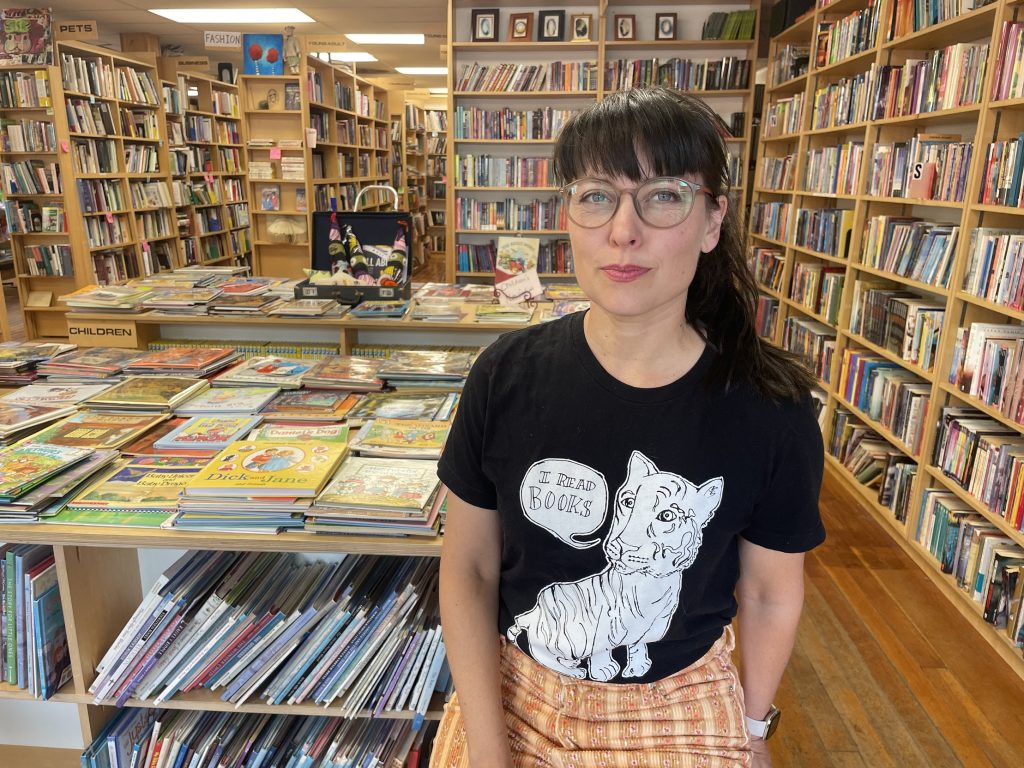
Since receiving the letter, City Councilmember Tom Van Overbeek has met with concerned business owners. The Bookstores’ Hughes, who gathered signatures for and sent the letter to the city, attended the meetings with the councilman, and afterward, when asked if the kiosk/customer situation had improved she said, “I would say nothing substantial has changed.
“I have talked to a lot of business owners and they have gone through the pandemic, they have gone through fires, economic ups and downs,” Hughes said. “Many have been downtown 30-plus years. They’ve said nothing has been as bad as these kiosks. … It’s beyond adapting to a new system. This system, the interface is not functional for most people. That’s a huge problem.”
Van Overbeek told the CN&R that he recognizes that there are issues with the new system. “I think the user interface at the kiosk is clunky and could be better,” he admitted. Though he did praise the Passport parking app component.
In the wake of receiving (and publishing) the letter, the CN&R spoke to many locals—business owners, random folks on downtown sidewalks, etc.—about the new system and there were a fair share who also appreciated ease and convenience of the app. However, far more expressed frustration with the changes.
“Nobody likes change, particularly in Chico,” said Van Overbeek, adding that he thinks that downtown will continue to draw people regardless. “If you like to drink beer in a beer garden, or you like the lasagna at Crush, you’re going to go down there,” he added. “At this point the city is committed to it and we’re not going back.”
The city did implement a few measures to try and smooth out the transition. In collaboration with DCBA, it rolled out a few parking incentives: one free four-hour parking session for downtown shoppers; a 20 percent discount for downtown employee monthly parking passes (in 10-hour lots); and free parking session coupons for business owners who promote the new parking app. And starting June 19, the DCBA launched a four-week Kiosk Concierge program, with helpers in bright-orange shirts roaming downtown during peak hours and assisting patrons and business owners with the new parking system.
Additionally, City Manager Sorensen lobbied the city council to amend the policy on card transaction fee requirements, which enabled him to address the 35 cent charge for those paying at the kiosk or app with a bank card. Now, those making a minimum one dollar transaction (the cost for one hour of parking), will have the fee waived. Another change that’s been made, according to Sorensen, is the addition of an undisclosed amount of buffer time to allow for payments to be made at kiosks on the app.
Whether these changes will be enough to remedy the situation with customers returning downtown remains to be seen.
“Short term, a lot of businesses have lost money already,” said Hughes. “Long term? I’m way more concerned [about] people who get out of the habit of coming downtown,” Hughes said. “People have to want to come downtown. They can sit at home and shop online. They can Door Dash their food. It has to be a positive experience.”
What’s happening inside all the corner spots?
The eight corners at Second and Broadway streets and Second and Main streets are arguably the most high-profile commercial locations in downtown Chico, and five of them appear to have nothing going on and have been mostly boarded up for years. Is there anything planned for these desirable store fronts on the ground floors of five historic downtown buildings?
Yes, in varying stages.
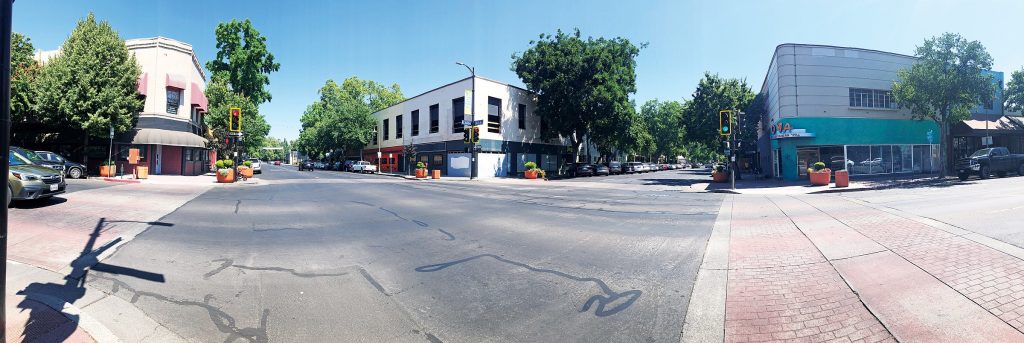
Inside one of the corners—at Second and Main, in the old Cyclesport location—work is almost done on the latest endeavor of Will Brady. He is in the process of selling his two main businesses—The Banshee and B Street—to his partners, and this fall he plans to open the doors to a bakery/pizza place (with the working title of Bodega—though he says it will likely change) at the corner in
question.
Brady says he’s also making plans to remodel/rename his mid-block Bill’s Town Lounge place across the street, with the goal of making it less restaurant/more bar-like inside. (“Maybe we should have a bar scene again?” he asked, rhetorically.) The new bar has a working name of “Black Dog,” a reference to the beautiful mural of his own pets out front.
Three of the corners in question are owned by the one person, David Halimi, local commercial property investor, rodeo/concert promoter and owner of the iconic Diamond W. Western Wear, a downtown institution for 45 years.
For his latest efforts to get his prime corners occupied, Halimi has decided to get into the restaurant business himself. He’s started with the just-opened Meze Moon, a Mediterranean restaurant that he’s put in a mid-block space on East Second street (in the former location of the short-lived French-style bistro, Provencal).
His next project is underway at the Second and Main corner that used to house Peet’s Coffee, where he will be opening his own coffee shop. Upstairs in the same building, Halimi has re-started work on “very high end” lofts. “We need people to live in some of these unused second floors,” he said.
Halimi told the CN&R that his other two corners—the old Oya Mediterranean Grill/Pluto’s spot at Second & Main and the two-space first floor beneath Crush Italian restaurant at Second & Broadway—are currently housing place-holders. The former is a temporary woodworking studio of a friend of his and the latter is a storage spot for the DCBA.
After his coffee shop opens, Halimi’s next project is to open another restaurant with his Meza Moon partners in the big space underneath Crush. For the Pluto’s spot, he say “We’re looking hard to find a national tenant.”
And empty corner number five, the Second & Broadway spot most recently home to Beach Hut Deli? No concrete news yet, but word on the street is that it’s been leased by a quick-service restaurant. The CN&R will be keeping its ear to street corner.
What’s new?
Looking past the boarded-up high-profile spots throughout downtown, it might be surprising to see just how many new businesses have opened downtown: The Coin-Op Chico game room, Lili’s Brazilian Bistro, PB & Jimmy’s, Sofi’z Kitchen and Bar, Meze Moon Mediterranean restaurant, Momona Noodle & Bao (in a new, bigger location), Karaoke Television, Ikoda Collective, Men’s Underground clothing (below Urban Couture), Taco El Dorado, Hoff Dogs, Mas Vida Mexican food (in the Phoenix Building), Oshio Teriyaki (in a new brick-and-mortar spot) and The Outlet (by Lulu’s).
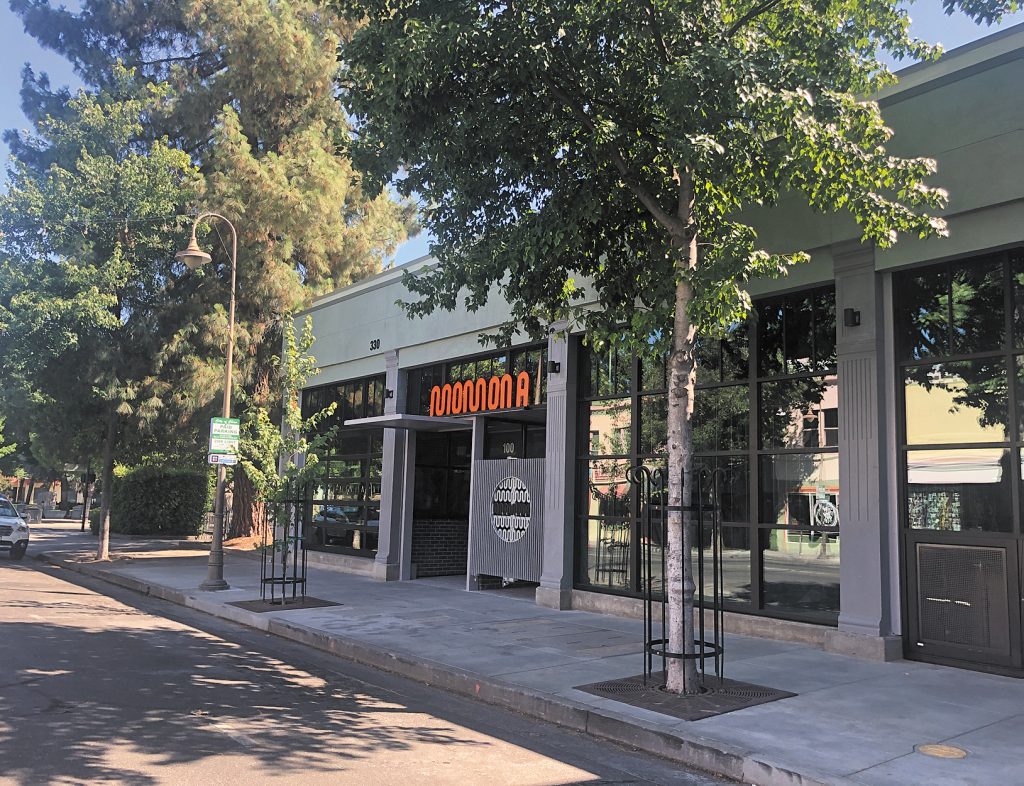
(Photo by
Tina Flynn)
Add the two soon-to-open Brady restaurants (the old-school bar in his former Bill’s Towne Lounge spot, and a bakery/pizza place at Second and Broadway); plus the fairly recent additions of Gnarly Deli, Winchester Goose, Alter Ego Costume and D’Emilios Deli & Bakery; as well as the relocated Sicilian Cafe and The Roost, the reopened Tin Roof Bakery & Cafe, and the soon to reopen Lost on Main nightclub, and the sting of losing Om on the Range, Jamba Juice, Zot’s Hot Dogs & Deli, Ellis Arts & Engineering, LaSalles, Lemonshark Poke, Kona’s, Beach Hut Deli and Magnolia’s downtown gift shop isn’t so harsh.
“I think downtown is coming back,” said Grayson Lobosky, fairly shouting over the clangs of basketball games behind him inside his new business, Coin Op Chico.
Lobosky grew up in Chico, attending Chico Junior and Chico High before leaving for 15 years, moving all over California and learning the restaurant and bar business along the way. Five years ago, he was lured back home to help La Salles re-open after an extensive remodel, after which he also helped open two more local businesses—Strong Water cocktail lounge and Burban Kitchen.
Before he started his own game room, Lobosky had tended bar at the Sacramento location of the small Coin Op chain (there are another three in the San Diego area). “First day I worked there I’m like, ‘Oh my god, this would do so great in Chico,’” he said.
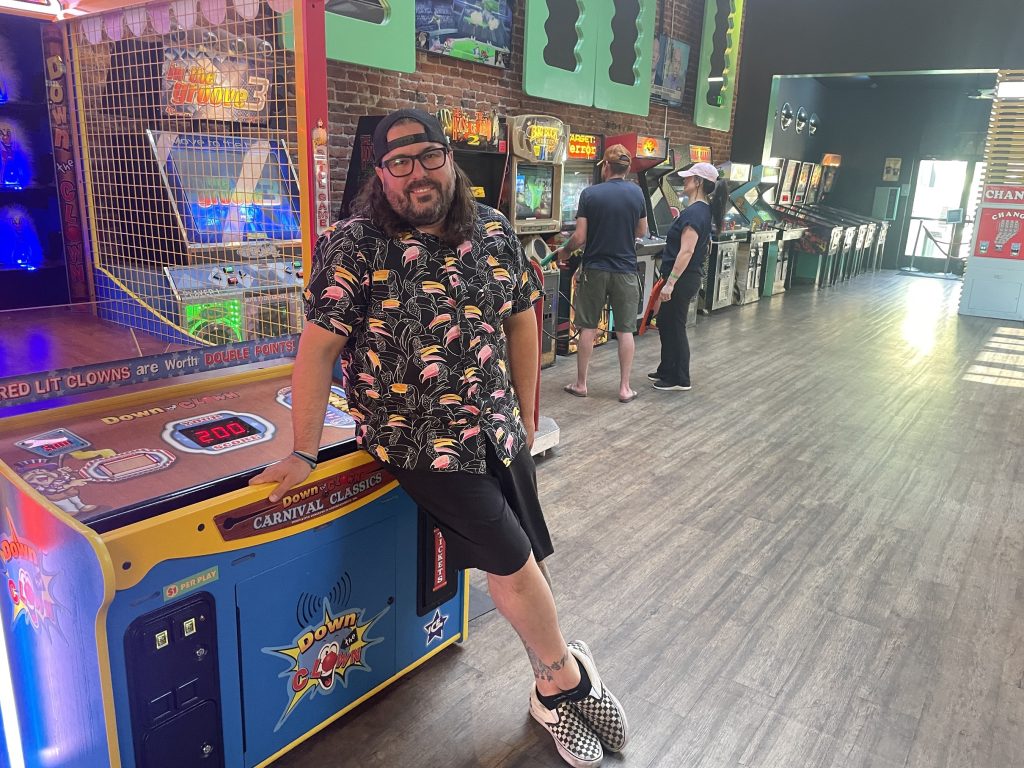
When he agreed to partner on a Chico version of Coin Op, he initially got to work converting a 5,000 square foot warehouse at Ninth and Cherry Streets. However, he said, when La Salles owners Nick Andrew and Kevin Riley approached him about selling their business, he jumped at the chance to go downtown. The old La Salles space was opened up to accommodate a ton of games—pinball machines, old-school and new-school arcade games, and large carnival-style machines like Skee-Ball—with the intention of bringing something fun downtown for kids and adults (21-over kicks in at 7 p.m. on weekends, and 9 p.m. on weekdays during the summer; and will start a little earlier when school is in session).
“I grew up on East Fifth street,” Lobosky said. “I rode my bike down[town] every day, and seeing the buildings start to fill up is awesome. It makes me happy.”
Are parklets coming back?
Short answer: No.
After COVID-19 restrictions were in place, restaurants all over the world were given wide latitude to make changes that could help them feed people and stay open. One of the most visible was the installation of temporary parklets to allow for socially distanced outdoor dining, often at establishments that had no patio options pre-pandemic.
In Chico, the parklets were formed by taking over a handful of parking spaces in front of an establishment and arranging a protective border with concrete K-rail barriers. The allowing of parklets—and the loosening of outdoor alcohol restrictions by the California Department of Alcoholic Beverage Control (ABC)—was a lifeline for places like Duffy’s Tavern, The Bear and The Banshee. And as early shelter-in-place restrictions were lifted, those who were jonesing for, and comfortable with, getting out with others were treated to an inviting, often energized downtown scene of outdoor dining and revelry.
At the end of 2022, as City of Chico’s Local Emergency Order for the pandemic was due to be rescinded, so to was the permission for the parklets. Roughly $300,000 of American Rescue Plan money was allocated to help businesses with the cost of constructing more attractive versions of the hastily assembled parklets.
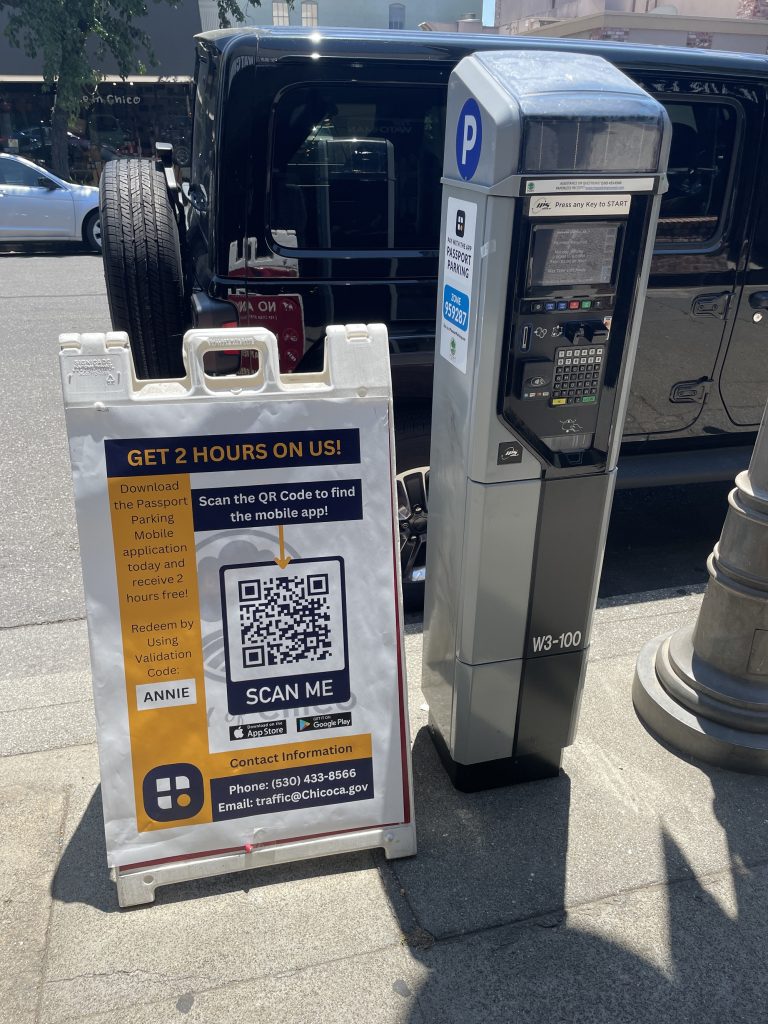
(Photo by Jason Cassidy)
However, as City Manager Sorensen told the CN&R, what killed any plans for incorporating street parklets into existing city code was the eventuality (in Feb. 2024) that the state’s department of ABC will lift its temporary allowance of serving alcohol to a detached patio (e.g., across a sidewalk and not connected to a building). That leaves restaurants and bars with the current contiguous options for patio additions (e.g., those attached to the outside of The Rawbar and Tres Hombres).
Could “downtown” really get a new name?
At a March 7 Chico City Council meeting, Councilman Van Overbeek made a request to agendize a discussion to “change references to Downtown Chico in Chico’s public documents and signage to Historic Downtown Chico.”
It’s one of many requests pertaining to downtown that Van Overbeek has brought to the council during his first six months on the dais. Others have included implementing diagonal parking on multiple downtown streets; creating pedestrian-only zones (he gives Third Street between Broadway and Main as one example); and posting monument signs on historic buildings.
“Downtown is a focus of mine,” he said during a recent telephone interview.
In his proposal, Van Overbeek said that Chico’s “unique personality” is largely due to having so many preserved historic buildings in the downtown area. “That creates a differentiation and also some interest,” he added.
Van Overbeek said that the decision on the name will have to be made by the downtown business owners, and DCBA President Scott said that he’ll respond to the City Council with members’ official position by the end of July.
While Scott says he is in favor the change, ultimately it’s up to membership. “My most important goal as DCBA President is to rebuild the relationship with our shareholders.”
Many downtown business owners the CN&R has spoken to have expressed concerns, saying that a name change isn’t necessary and that adding “historic” could bring with it an “old-timey” connotation (see: Old Sacramento) that is out of touch with the college demographic that so many businesses depend on attracting into downtown each school year.
Hey, what happened to 7-Eleven?
One day the iconic downtown convenience store was there, the next day the Buffalo Chicken Rollers stopped rolling and the tiny speakers blasting classical music to the parking lot went silent.
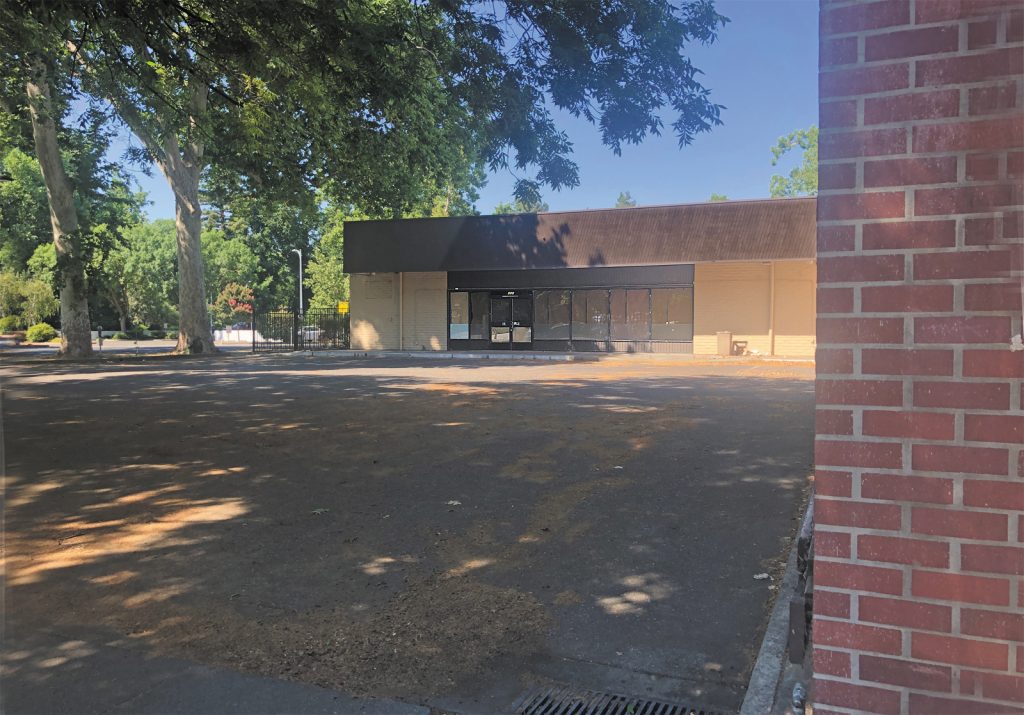
(Photo by Tina Flynn)
The 7-Eleven at the corner of First and Main streets was a Chico staple for nearly four decades until late last year, when it was shuttered seemingly overnight. No one who the CN&R has spoken to knows for sure why it suddenly closed. Social media chatter circulating mentions that it was a corporate-, not franchisee-, owned location and employees there say they were told it wasn’t making enough money (emails from the CN&R to 7-Eleven were not returned).
Some have speculated that it was the lack of gasoline sales—apparently a vital part of the company’s business model —that doomed the convenience-store-only location. However, only one of the remaining three 7-Eleven’s in Chico has pumps, so who knows.
Whatever the reason, it’s the end of an era for sure. Let us pour out a Double Gulp in honor of the memories.
The post What’s up with downtown? appeared first on Chico News & Review.

